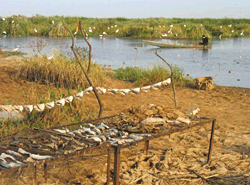| Building on long-established
working relations and regional experience from past interventions,
ECO since 2012 has promoted enhanced management of the Diawling
National Park. The project forms part of a sophisticated programme
structure, harnessing the comparative advantages of technical
(GIZ) and, financial (KfW) cooperation in pursuit of a more
climate-sensitive as well as adaptive resource management.
Being the third out of a total of three components of the
programme’s technical cooperation module, the project
“Advisory support to the management of Diawling National
Park” in essence aims to pioneer and demonstrate integrative,
non-confrontational and socially equitable means of conserving
and developing marine and coastal protected areas of supra-regional
significance. As such, Diawling NP forms part of a wider network
of high-level protected areas dedicated to the conservation
of the unique biological diversity of Mauritania’s coastal
zones.
Reflecting its comprehensive and multi-layered intervention
logic, the project applies a combination of capacity development
and knowledge transfer, institutional strengthening, and community-based
sustainable resource management. Protection by means of sustainable
use lies at its core, where rural communities utilize wetland
resources in line with management plans and rules that have
been developed in a participatory fashion. In parallel, the
national park
|
 |
|
| Improved resource management
helps sustain the ecological balance in one of the world's
most important bird refuges. |
administration is capacitated
for diversified service provision, effective protection
and enforcement of management rules, and administration
of a trust-fund ensuring the continued existence and operation
of state-of-the-art protected area management frameworks.
As such, the project generates
a wide range of lessons learnt and best practices which,
using the technical cooperation module’s first component
(“Environmental and climate policy advisory support”)
as a transmission-belt, are being fed into the wider climate-
and environmental policy dialogue on the national level.
|

